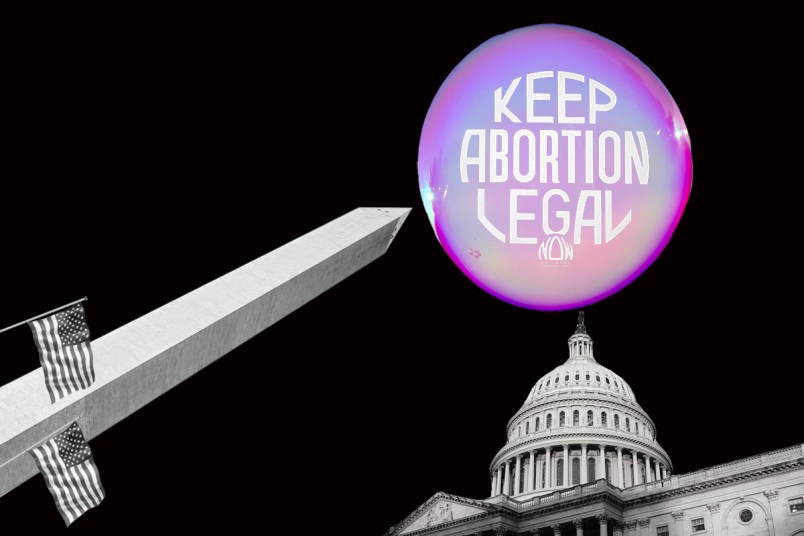With the Supreme Court poised to overturn Roe v. Wade, many have already started scratching out the calculus to determine where abortion access will be protected, and where it’s endangered.
In the usual respects, Washington D.C. fits the bill of a guaranteed abortion safe haven: it dependably hovers at the top of lists ranking the most liberal cities, with 92 percent of the city’s vote going to President Joe Biden in 2020. Most local elections are decided in the Democratic primaries.
The city’s abortion laws largely reflect its inhabitants’ politics. Abortion is legal in the district in all three trimesters of pregnancy, and the city has some of the least restrictive access to the procedure in the country.
Except — in most cases, D.C. taxpayer money cannot be used to subsidize abortions for women on Medicaid, a significant barrier for the often low-income and disabled people the program covers.
That stipulation came not from the city itself, but from across the country: Former Rep. Robert Dornan (R-CA) initially offered the amendment to D.C.’s budget in 1988, and it has usually been attached since. It’s in effect currently, though the amendment has occasionally been lifted during periods of national Democratic control.
Dornan is just one of many Republicans who have tried, with varying levels of success, to interfere with the district’s self governance. Theoretically, Congress’ power to do so is expansive, though the Senate filibuster often dissuades GOP lawmakers from proactively passing new laws directed specifically at D.C.. But lawmakers find other ways to impose their policy preferences on the city.
“It is usually budgetary and through appropriations because, normally, the Senate is a more difficult house to get such matters through,” Rep. Eleanor Holmes Norton (D-D.C.), the district’s longtime non-voting delegate in Congress, told TPM.
Republicans don’t restrict their manipulation of D.C. laws to abortion: they have also periodically banned public funding of the city’s needle exchange program, pumped in money for a GOP-favored private school voucher program that the then-mayor opposed and sustained a ban on selling recreational marijuana despite the will of the district’s voters.
“There have been plenty of times when Republicans have something on the agenda that they’re not able to pass nationwide, but are able to use D.C. as a guinea pig,” at-large city councilmember Christina Henderson (I) told TPM.
But on abortion, even symbolic attempts to hew back the city’s permissiveness come like clockwork. Norton expects the barrage yearly, usually corresponding with the anti-abortion March for Life.
Many of those attempts have fallen victim to the unusually high number of veto points built into the U.S. federal government that keep many bills from passing: the filibuster, often-split party control of Congress, the presidential veto.
But local leaders are taking cold comfort in past GOP failures. They see a Republican Party highly motivated to ban abortion nationwide, made up of members who would consider it a great feather in their cap to ban the procedure in the nation’s capitol. And without statehood, D.C. has few means to protect itself in the case of a GOP takeover of Congress.
Prognosticators are uniform in their painting of a bad midterm picture for Democrats: even setting aside externalities like high inflation rates and lingering pandemic uncertainties, political trifectas are historically not long for this world. If Republicans retake both houses of Congress, especially if Roe is overturned by then, as expected, GOP lawmakers may well set their sights on trying to restrict or ban the procedure in the city.
That would leave Biden and his veto pen as the stopgap, at least until 2024. But as district leaders pointed out, a successful assault on D.C. abortion would likely not come in the form of a standalone bill.
“I know, having worked for Schumer’s office, how some of these bills come together,” Henderson said. “It would be something like a defense appropriations bill and we’ll just tack on an amendment about D.C. abortions and that’s how it happens.”
“It’s very difficult if it’s put on a must-pass bill,” Norton said, adding: “And this President seems rather shaky on abortion.”
In the meantime, the district has been shoring up its abortion laws, with Henderson putting together legislation to undergird protections for self-managed abortions in particular.
“I think the district, in terms of the city council and the mayor’s office, are doing everything they can to protect abortion access,” Laura Meyers, CEO at Planned Parenthood of Metropolitan Washington, told TPM. “To the extent they can, given that in our non-state status, this existential vulnerability exists.”
For many D.C. leaders, conversation about the district’s rights always comes back to a defining issue: statehood. Only full admission as a state would give D.C. — with its 702,000 inhabitants — control over its own governance, would ensure that it remains an abortion safe haven no matter which party controls the federal government. Some hope that abortion coming to the fore of national attention will help infuse the issue back into the bloodstream.
“We are preparing for a Republican takeover of Congress, where they have even threatened to try to get rid of Home Rule, much less abortion,” Norton said, referencing D.C.’s current system of local governance. “The district is vulnerable as no other jurisdiction is.”



